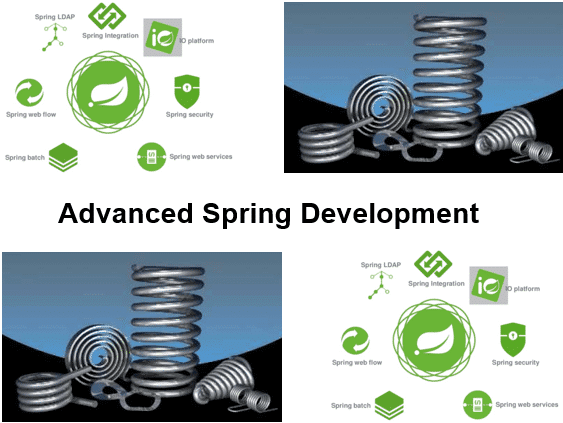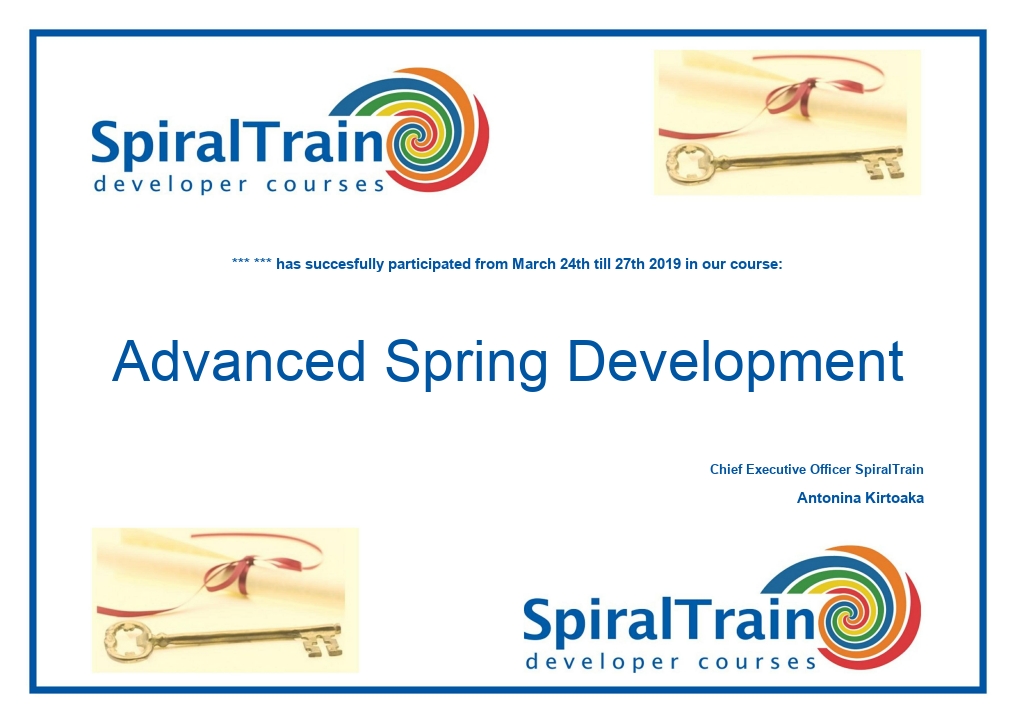-
Learning by doing
-
Trainers with practical experience
-
Classroom training
-
Detailed course material
-
Clear content description
-
Tailormade content possible
-
Training that proceeds
-
Small groups
The course Advanced Spring Development deals with the internals of Spring and Spring Boot. Spring applications are configured using annotations and reflection with Java Beans and dependency injection. In addition to the basic functionality, the Spring Framework also offers numerous projects for specialist applications such as Spring Data, Spring Batch, Spring REST, Spring Kafka, Spring JMS and Spring Cloud.
The course Advanced Spring Development starts with a discussion of the inner workings of Spring. It explains how Spring Intern makes extensive use of the Java Reflection API.
Subsequently annotations are treated. The different types of annotations are discussed, such as marker and single value annotations. Meta annotations such as retention type and target, which determine for which constructs of the language and how long annotations are valid, are also covered.
Then it is time for Spring Boot with which modern Spring applications are made. The architecture of Spring Boot with Spring boot starters, the CLI and the Spring Boot Actuator are treated.
Database access from Spring Boot applications is covered when dealing with Spring Data. Attention is paid to the principles of Spring Data for accessing various types of data sources.
And the Spring REST project is also part of the course program. Spring REST makes it possible to quickly create and access REST Services with Spring Boot.
The Spring Batch project and its architecture is covered. Spring Batch has reusable functions that are essential when processing large numbers of records. The parts of Spring Batch such as Jobs, Steps, ItemReaders, ItemProcessors and ItemWriters are explained.
Finally messaging between Spring Boot applications through the Spring JMS and Spring Kafka projects is on the program as well and attention is paid to cloud applications with Spring Cloud.
The Advanced Spring Development course is intended for experienced Spring Developers who want to learn advanced aspects of Spring.
Knowledge of the basic concepts of Spring such as dependency injection and experience with programming in the Spring Framework is required to participate in this course.
The concepts are treated on the basis of presentations and demos. The theory is interspersed with exercises. The course times are from 9.30 to 16.30.
Participants receive an official certificate Advanced Spring Development after successful completion of the course.

Module 1 : Spring Internals |
Module 2 : Spring Annotations |
Module 3 : Spring Boot |
|
What is Reflection? Reflection Classes Class Loading Creating Objects Reflection Methods in Class Field Class Field Class Usage Constructor Class Method Class AccessibleObject Class Dynamic Proxies Invocation Handler |
What are annotations? Pre-Java 5 annotations Why annotations? Defining annotation types Using annotations Kinds of annotations Marker annotations Single value annotations Normal annotations Meta-Annotations Retention meta-annotation Retention Class and Runtime |
What is Spring Boot? Advantages Spring Boot Goal of Spring Boot Spring Boot Flavors Key Spring Boot Components Spring Boot Starter Starter Dependencies Spring Boot Autoconfigurator @SpringBootApplication Spring Boot CLI Spring Boot Internals Spring Boot Actuator |
Module 4 : Spring Data |
Module 5 : Spring REST |
Module 6 : Spring Batch |
|
What is Spring Data? Spring Data Configuration CRUD Out of the Box JPA Repositories Persisting and Modifying Entities Spring Data Queries @Query Annotation Named and Async Queries Paging Results Customizing Repository Behavior Spring Data MVC Integration MongoDB Template Mapping and Inserting Documents |
What is REST? Request Processing Spring MVC @Controller @RequestMapping Methods @ModelAttribute REST Web Services Simple REST Examples REST Web Service Principles @RestController Embedded Path Parameters Json View Resolver Multiple Representations Content Negotation |
What is Spring Batch? Concepts and terminology Steps and Items Tasklets and Chunks Readers and Writers Processors and Executions Configuring Spring Batch Creating jobs and steps Creating a JobRepository Scopes and Listeners Scheduling and Shutdown Controlling Execution Scalability and concurrency |
Module 7 : Spring JMS |
Module 8 : Spring Kafka |
Module 9 : Spring Cloud |
|
What is JMS? Messaging Characteristics and Models JMS Architectural Components Spring JMS JMS with Spring Spring JMS Options Spring JmsTemplate Send and Convert Execute Method ProducerCalback Receive and Convert Message Listener Containers SessionAwareMessageListener MessageListenerAdapter |
What is Spring Kafka? Sending Messages KafkaTemplate Transactions ReplyingKafkaTemplate Receiving Messages Message Listeners Message Listeners Containers @KafkaListerner Annotation Container Thread Naming Lifecycle Management Retrying Deliveries Stateful Retry Kafka Streams Support |
What is Spring Cloud? Spring Cloud Config Eureka Service Spring Cloud Bus Spring Cloud Cluster Spring Cloud Security Spring Cloud Data Flow Cloud Task Spring Cloud Connectors Spring Cloud Task App Starters Spring Cloud Zookeeper Spring Cloud CLI Spring Cloud Gateway Spring Cloud Pipelines |
